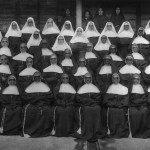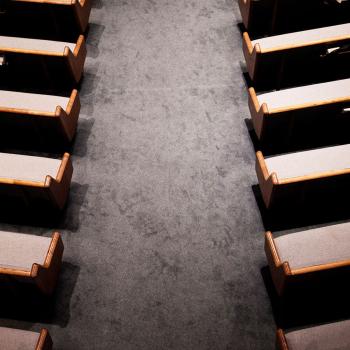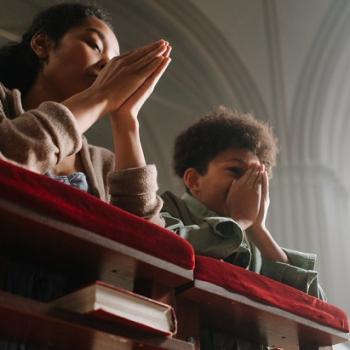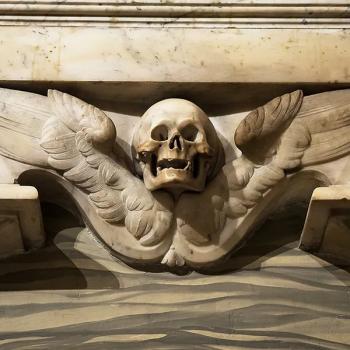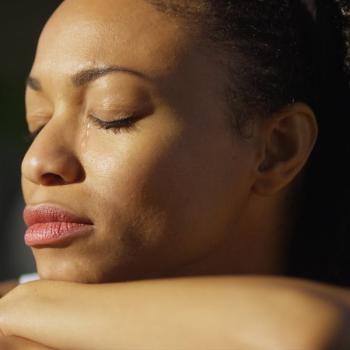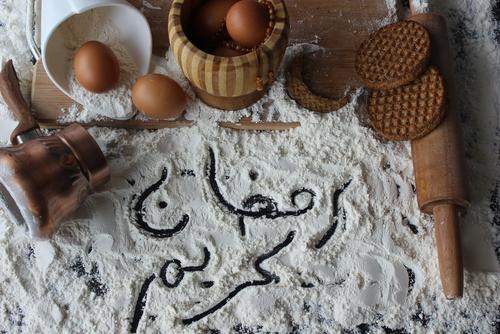
By Joe McHugh
Ramadan 2015 starts on June 18th and ends on July 17th, and, even though I’m a Catholic Christian, I plan to observe it again this year, just as I did in 2014. I have little idea what this year’s observance will bring, but let me tell you how it affected me last year and how it molded and shaped my religious sensibilities while ultimately confirming the Christian quality of my religious quest.
The first time I prayed with Muslims in the mosque on Central Avenue in Minneapolis was on a hot Friday afternoon in late June 2014. It’s located in a rundown strip mall across from the Love Lines Christian Counseling Center, just half a block north of Frankie’s World Famous Hamburgers and Hot Dogs.
I got there early enough to watch women in hijabs, veils covering heads and shoulders, enter through the door reserved for them, while the men I followed entered through their entrance next to an Ethiopian restaurant. Once inside, I left my shoes in the vestibule, followed the other men into the prayer area and quickly found a place to sit on the floor with my back up against a paneled wall—out of the way, I hoped. The Muslim men lined up along white lines in the dark blue carpet, and the women gathered in a separate space, out of sight.
The word Islam means submission, something I saw enacted as the men cupped their hands and raised them to their ears before kneeling and making two deep prostrations, reverential gestures that reminded me of genuflections Catholics make when entering a church. The white lines in the blue carpet proved less decorative than strategic: they made sure everybody faced toward Mecca when they prayed.
After the call to prayer, the adhan, was chanted, the young Imam spoke in Arabic for five minutes before preaching the rest of his sermon in English. The sound system had an annoying echo in it that made it hard for me to understand him. Only later did I discover that the echo was deliberately engineered to mimic the sound one would hear in the cavernous prayer space in Mecca.
The Imam preached about God’s compassionate, merciful forgiveness, assuring us that all we needed to do to receive it was to say, “I’m sorry,” a disarming, uncomplicated and heart-felt message that reinforced the Muslim belief that we experience God most directly as extravagant mercy and compassion.
When the prayers were finished, the Imam abruptly switched rhetorical gears and pressed his congregants to give money for persecuted Muslims in Palestine. “They’re our brothers and sisters in Islam,” he said, “and they have a right to our support.” Nobody dared to leave, it seemed, until somebody got the ball rolling with a $1,000 pledge.
His appeal underscored the deep commitment Muslims have to social justice, a religious responsibility that is becoming more urgent for Catholics through the words and example of Pope Francis. All religions, it seems, struggle to find faithful expression in deeds of charity and justice.
While the pledges were collected, I slipped back to the vestibule to retrieve my shoes. This time bread was on sale there and the parking lot outside was teeming with opportunistic merchants hawking discount cologne and clothes for kids.
I didn’t go to the mosque because I was having a crisis of faith or was shopping for a new religion, but what I was experiencing was a inner restlessness that suggested my religious sensibilities were due for a tune up, perhaps even a shake up. Either supernatural grace or natural curiosity led me there that day—take your pick.
What I know now is that a gnawing sense of being too spiritually comfortable, perhaps even a bit religiously complacent, led me, compelled me, really, to take a chance on the renewing touch of new grace. I just didn’t know where to look for it.
A couple of days later I saw a notice in a church bulletin that the mosque on Central Avenue was inviting Christians to join them for iftar, the small evening meal that breaks the daily fast during the penitential month of Ramadan. As soon as I read the notice I knew, right there and then, I needed to observe Ramadan.
Since it started in less than a week, I bought a copy of the Koran and scrambled to see what Ramadan would require of me. I knew fasting from food from sunrise to sunset was required, but I didn’t know that the fast also included abstaining for drinking, including water.
To make things even worse, since Ramadan in 2014 came during the summer, there were seventeen hours of fasting each day. It was then that I wondered why grace couldn’t have inspired me to do Ramadan when it came during the winter, when the time between sunup and sundown was much shorter. Ramadan suddenly seemed a bit more ominous, but, despite my misgivings, I decided to give it a shot.
Since Judaism, Christianity and Islam were all born in the transforming call and pilgrimage experience of Abraham, I wanted to discover what united rather than separated these religions. With that in mind, I shelved my bible and took up the Muslim practice of reading the entire Koran during Ramadan, a protracted time of prayer, penance, reflection and reformation similar to Lent in the Christian tradition.
I wanted to experience the Koran on its own terms, so I read it without a commentary, something that made feel like a high school kid again, when I read Shakespeare for the first time, naively assuming that understanding the words meant I appreciated the poetry. It wasn’t until two weeks into Ramadan that I started to get occasional yet faint insights into the spiritual depth of the Koran.
I started my prayer each day during Ramadan by reading the first seven verses of the Koran, the Al-Fatiha, a brief poetic summary of Islamic faith, something of an Islamic creed. “In the name of God, Most Compassionate, Most Merciful,” is how it starts, an invocation designed to usher the believer into the presence of the one utterly transcendent God, a God who, unlike the Christian God, knows nothing of incarnation, much less trinity. But since the Trinity is a summary of Christian faith, Catholics, by contrast, start to pray by saying, “In the name of the Father, and of the Son, and of the Holy Spirit.”
The Fatiha then begs God to keep the person reciting it on the “straight” path of fidelity, and, by implication, away from the ways of infidelity, idolatry and self-seeking. Being a pilgrim always seeking the road that leads toward rather than away from God is a foundational image in all Abrahamic religions, appearing not only in their sacred texts but also as a principle of spiritual discernment.
Islam is a religion of precise observance. Not only do Muslims pray facing Mecca, they’re just as exacting about when to start and stop fasting each day during Ramadan. Many Muslims consult websites for the exact times for sunrise and sunset, but, perhaps as a concession to technology’s intrusion into my soul, I relied on my iPhone to keep me on schedule.
All this gave me a taste of the new Catholic convert’s zeal for observing rules and getting rituals right. External observance is the first step in establishing group identity and is only later does a person incorporate the group’s interior spirit, an experience that balances the interior lives and external practice of any group, religious or secular, and demonstrates the biblical distinction between the letter and the spirit of law.
What I got out of Ramadan at the end had practically nothing to do with what I had in mind at the beginning. Unfortunately, part of me is still in love with magic, and I was sure Ramadan would force me to confront my deepest hungers and connect me with previously undiscovered and unimagined sources of spiritual power that would change my life forever and help me—finally—“get it all together.”
After a couple of days, however, my body got used to fasting, and it finally dawned on me that I probably already knew more about my unruly passions than I needed to know, having gained at least elementary skills in distinguishing between those that lead me toward God and those that lead me in the opposite direction. What I did have to face, was the truth that most spiritual growth is tied up with what seems all ordinary and practical, rarely dramatic, certainly never magical. What’s required, however, is the suffering love that takes me right into the parts of my experience I prefer to avoid rather than live.
Most pilgrimages, however, take us to places we’ve only heard about but never visited, and my pilgrimage into Ramadan was no exception. The consolation I experience during Ramadan also came with a challenge to reconsider that I took for granted about my search for God. As a result, there were times during the month when I just felt confused and confounded.
My prayer during Ramadan was formed in images and stories from the Koran about biblical prophets, including Mary and Jesus, from a decidedly non-Christian perspective. These led to new insights that not only helped me understand Islam more deeply but also led me to a renewed appreciation for the theology that undergirds my Catholic Christianity.
The Abrahamic religions—Judaism, Christianity and Islam—are “religions of the road.” All their believers are on a pilgrimage in time, moving toward a personal and social endpoint traditionally described as eschatological, having to do with the ultimate mysteries of life and death, reward and punishment, fulfillment or destruction, final consolation or desolation. The choices made “on the road” have eternal consequences for believers, both individually and as a community.
Recognizing and then taking the straight road means that we need to be aligned with the what’s traditionally called “the will of God.” In other words, we need to learn how to recognize and heed the ambiguous markers that line the straight path, a process that’s called discernment. Seeking and doing God’s will means also means that we need to let go of the mistaken notion that the world revolves around us and our needs.
Pursuing and doing only what we want amounts to idolatry, the greatest sin of Islam and also clear roadblocks to fidelity in Judaism and Christianity. It means we have to take the first commandment seriously: “I am the Lord your God; you shall have no other Gods before me.”
When I reread the notes I made during Ramadan, I now that my Ramadan experience revolved around two fundamental questions. First, what kind of God do I believe in, and, second, what kinds of idolatry—substitutes for this God—have I allowed to make a home in my religious imagination?
The answer to the first question is fairly clear. While I can pray “In the name of God, the compassionate, the merciful,” something more than habit urged me to take up praying I knew I had to come back to praying “In the name of the Father, and of the Son, and of the Holy Spirit” again. What I had to learn was that the Trinitarian formulation is less a abstract description of God than a proclamation of the living content of Christian faith: we don’t believe in it as a “thing,” but, rather, believe in the midst of the Trinity as situations of God’s living presence for us.
Although Christianity and Islam trace their faith to the religious vision of the pilgrim Abraham, the description of the experience of God in each emerged with startling differences. Islam worships one God existing beyond human history while Christians, also worship one God who comes to meet us not only beyond, but also as the animating spirit in human experience, incarnated in history.
While the Muslim God exists beyond history, the God of Christianity just as importantly meets us in history in the person of Jesus. Many Christians take this even further with a belief in sacraments as activities of God in the give and take at the heart of decisive human events.
Christian theologians describe this back and forth between time and eternity as the living tension between the transcendence and immanence of God’s action and presence, experiences that lead us to reflect on what we believe about God’s relation to human history and experience. Is God involved or removed? Is our religious pilgrimage in the world only toward God, or, as Christians would describe it, is it also through, with and in the God we see incarnated in Jesus and animated in the Holy Spirit? In other words, I learned the difference between a religion of prophecy alone and a religion in which prophecy is completed in incarnation.
It was my reaffirmation of my belief of God’s activity not only in creation but also in evolution, in eschatology as well as history, in transcendence as well as incarnation that led me to conclude I’m not otherworldly enough to be Muslim. I need a God with skin who takes this world and human experience seriously enough to embrace it and us as sacred places of divine presence and saving activity.
Perhaps what doing Ramadan really taught me is how Christianity and Islam need each us to balance the potentially deadly and exaggerated, deadly and isolating extremism in both religions. Christians need Muslims to keep their eyes perpetually on the lookout for moments and transcendence, and perhaps Muslims need Christians to help them keep their feet fixed firmly on earth. That way we can complement each other rather than compete.
After all, Christians and Muslims have a shared spirituality, and learning to patiently learn what we have in common while gently respecting out difference is that the late John Dunne meant when he talked about how passing over to another point of view and coming back to our own consoled yet challenged just might be “the spiritual adventure of our time.”
I plan to observe Ramadan again this year and am interested in what surprises await me as I fast again, read the Koran again and once again find my way back to the mosque on Central Avenue in Minneapolis.
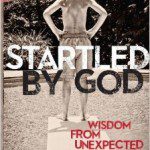 Joe McHugh is a spiritual director, retreat leader, teacher and freelance writer living in St. Paul, MN. He writes regularly for a variety of religious publications and his book, Startled by God: Wisdom from Unexpected Places was published in 2013.
Joe McHugh is a spiritual director, retreat leader, teacher and freelance writer living in St. Paul, MN. He writes regularly for a variety of religious publications and his book, Startled by God: Wisdom from Unexpected Places was published in 2013.



